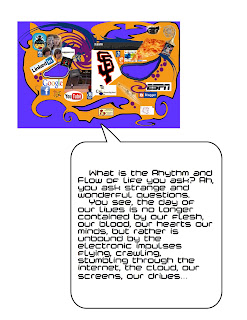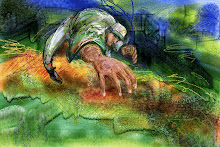
We just finished a round of student-led parent teacher conferences at our middle school. What struck me was the common thread of my students, echoed yesterday when we met as a group with another advisory, that they had trouble discerning the level of importance of assignments from their teachers. This has led to increased stress, and anxiety, and lowered performance, often on the most high stakes assessments.
At the same time, I am studying for the California Teachers of English Languages test, a test that effects my professional credentialing. As I read numerous textbooks and educational tracts on language acquisition, cultural differentiation and sociopsychological transitions, and then take the sample tests, I am struck by the disconnect between the testing structure, how we as teachers model testing anxiety, and how we hold dearly to types of assessment that don't really show learning. I am good at test-taking, and will pass this hurdle in my career, but don't trust the process, or its intended end. However, the reading does help me rekindle my interest in personal professional development, and how to best approach planning for my units. I never give tests, as mine is a project based classroom. I do need to make more frequent checks for understanding, do need to work on ways to give more immediate feedback, and do need to continue to vary the ways students can show both what they learned and how they learned.
The image is an example for my sixth graders who have finished a mask comprised of images of their lives (Adobe Photoshop Elements). My earlier post on totems is a different version of this lesson. Those who have finished then had the option of making the mask talk, using ComicLife to add the speech bubbles. This lesson then leads to a meta-unit on digital citizenship where the students will create superheroes to tackle immense issues involving the integration of technology in the life of the global culture we all live in.


11 comments:
I find it interesting that your students mentioned they had trouble figuring out which assignments were the most important for them to focus on. As we cannot always put 100% into each assignment. In my personal career and educational experiences, I also struggled with this. I have found that some of my professors indicate what percentage each assignment is worth in relation to my class garde. This helps me determine which assignments I really need to put the extra effort into.
I appreciate teachers who recognize that test taking isn’t the most effective way to assess what students are learning because often times the structure and content of testing isn’t designed to reflect how each and every student learns. I recently took an intensive all day First Aid course at City College of San Francisco. The way they measure what you learn is through a multiple choice test that you take at the end of the day. You have to receive a C or better to pass the class. You are advised to study the American Heart Association course book prior to the class so you can participate in the class and pass it. I took the multiple choice test and received a B. When my test was given back I looked at one of the questions that they classified as wrong and knew it was right if it was interpreted the way that I interpreted it. So I took my test to the department chair and explained how I interpreted the question and how I answered it. She completely agreed that if the question is looked at through my perspective, my answer is right. Then she changed my answer and recorded it as correct. Getting that answer correct, bumped me up to an “A” grade because I was only one question off from getting an “A”. Often times, multiple choice tests don’t take into account the difference of interpretation of test questions, this puts people with learning disabilities (like myself) at a disadvantage. I can’t tell you how many times I have to stand up for how I process information differently and how I am constantly fighting to stay neck and neck with students who can get good grades easier than I can because tests are designed to accommodate their thought processes better than mine. I think that if tests are eliminated and teachers assess each student based on how each individual person’s brain processes information, teachers can get a more accurate assessment of what and how students are learning.
I agree that in both a school and professional setting, it can be difficult to prioritize assignments. For many middle school students, it is the first time they have more than one teacher assigning homework. As a result, it's easy to feel overwhelmed by the work. Giving students time management and prioritization skills within the classroom setting can help them be set up for success later in life.
I agree with you, that tests are not the only way to assess our students as well. I was just reading this post, and realized that I often TEST my students, who have learning disabilities AND emotional disturbances. They often have anxiety and stress over my tests. I try to observe my students and have one on one discussions about the material with them, but sometimes, testing is my only option to move forward. This post gave me the idea to research different methods of teaching my particular group of students.
Also, I am studying for the CTEL exam as well, and I am NOT a good test taker. I have scheduled my exam 8 months in advance so I can get enough studying in before the BIG DAY. Please post a blog after you take the exam and let us all know how it went! And any tips you could give to us studying for it!
I find that I see that disconnect between the students and the importance of certain assignments often. It is interesting to actually hear this story opposed to observing it passively.
The mask idea sounds absolutely fun and I love the picture.
- Megan (ITEC class)
It is hard for educators to equally divide their time between everything thing listed on the CA State Standards for their classes, obviously. One piece of advice that a master teacher recently told me was to examine the standards for the grades below and after your current grade. This will give you an idea of what knowledge they are coming in with (hopefully) and where they ultimately need to be to have a successful transition to the next year. As for creating a relevant way to make assignments and useful assessments, I think I would try to find a balance between the standards and student choice of what they want to learn. If what is contained in the standards or that may show up on a standardized test can be presented in a way that is engaging, students can successfully learn. That may sound obvious and be a challenge, but it will be helpful to employ some of the resources and tools presented in this ITEC class to make these subjects accessible and interesting.
One of the challenges I have with teaching next semester is dealing with assessments. As a science teacher, I also like project based assignments, but I also see the need for daily checks for understanding with my students. I'm not sure if I will be using quizzes, tests, exit slips, journal entries, some or all of the above or other methods of assessment.
I like the idea of project-based assessment. But like you've said, requires other types of assessment to make sure the student understand the material. As an English teacher, I really want to instill this inquiry-approach to my units, but I also recognize that my high school students will have to deal with writing essays, timed essays, expository writing, etc. I suppose for me it's a challenge to merge the two. The word "essays" sends annoyance to many, but it could be an opportunity for inquiry and deeper-learning.
As a math teacher, I find that I am over-reliant on traditional forms of assessment, largely since that is what the students are use to and that is what comes easiest to both of us. But I have found that traditional assessment does not provide students with every opportunity to demonstrate what they know and often alienates students by failing to give them any access whatsoever to the material. All my attempts to assign creative assessments have been difficult though since the students simply do not know what is expected of them and since it is a new form of assessment, they assume that it isn't worth that much in terms of their grade. Any advice?
When you said your students have a hard time discerning importance on assignments it made me wonder if students are having the same problem in my classes that I am student teaching. It is definitely something that I will think about and try to figure out a way to show students which assignments are most important.
Post a Comment